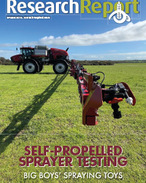This article is 8 years old. Images might not display.
The WA Farmers' stance is in response to concerns that mobile domestic roaming could stifle investment in telecommunications across rural and regional Western Australia, state farming body However, WAFarmers executive officer of policy, Grady Powell, encouraged all telcos to continue investing in and expanding on their networks in the bush.
“The number one issue raised across the regional community is digital connectivity,” Mr Powell said.
“Telecommunications have now become a necessity for rural businesses and WAFarmers encourages all retailers to continue and expand their investment in rural and regional infrastructure,” he said.
Over the ACCC submission period, Telstra outlined its intentions to expand its 3G and 4G networks.
“The ACCC decision now paves the way for Telstra to roll out its intended plans of an expanded network across regional Australia, WAFarmers urges Telstra and other telco’s to act swiftly to improve rural connectivity,” Mr Powell said.
WAFarmers said it agreed with the ACCC’s recommendation that now is a good time to review the Facilities Access Code.
Changing the code may create an environment where an increase in co-location or infrastructure sharing may occur.
Powell said although there is currently no regulatory road block preventing co-location from occurring.
“Reviewing the code and seeing whether changes may incentivise co-location with the aim of improving access and connectivity across the regions can only be a positive measure,” he said.
“Now the uncertainty surrounding domestic roaming has been resolved, WAFarmers urges the telcos to act collaboratively and expand their rural and regional mobile networks to create a digital environment where Western Australian agriculture can reach its full potential.”























